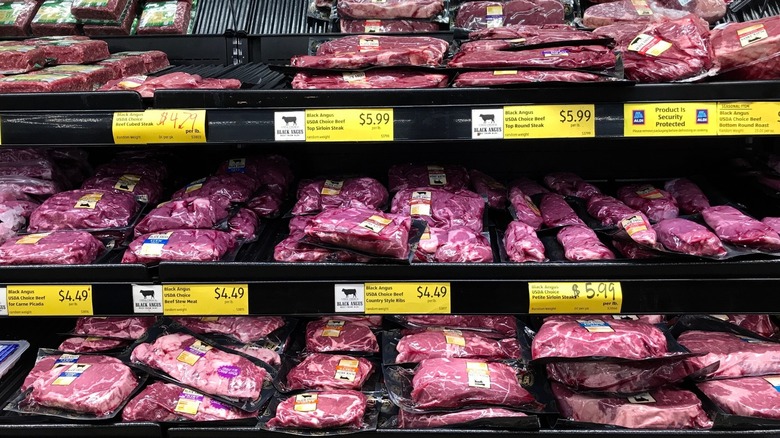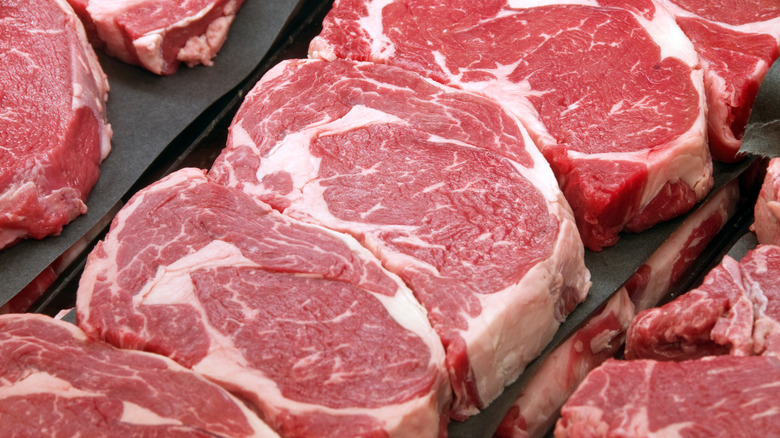The Aldi Horse Meat Scandal, Explained
There's nothing wrong with questioning where your food comes from, especially when you've been given so many reasons to in the past. Though you'd generally think food labels are transparent, that's not always the reality. Sometimes, they can simply be misleading, while other times, they may be entirely incorrect.
As reported by The Guardian, an incident of the latter type occurred in 2013 when products from Findus, a Swedish food company utilized by Aldi and other stores throughout Europe, contained horse meat. The frozen foods, which were labeled as 100% beef, were found to contain somewhere between 30% and 100% horse meat. In light of the shocking tests carried out by the Food Standards Agency of Ireland (FSAI), lasagna and other grocery items from Sweden, the United Kingdom, and France were pulled from Aldi shelves across Europe. "This is completely unacceptable, and like other affected companies, we feel angry and let down by our supplier. If the label says beef, our customers expect it to be beef," an Aldi spokesperson told CNN at the time.
Although the food was produced by Findus, the company said that its French-based supplier was actually to blame. It also claimed to have no knowledge of the contamination prior to the FSAI's report. The European food industry faced a grave reckoning following this news, which not only exposed the complex and interconnected nature of the global food supply chain but also ignited debates about food safety, regulatory oversight, and the integrity of the industry as a whole.
Manufacturers fight over who's to blame
After horse meat mislabeled as beef was unknowingly sold in Aldi, food producer Findus immediately pointed fingers at Comigel, its supplier. In an interview with CNN, the company branded Comigel as a "villain" and announced its plans to take legal action. Findus strongly believed the supplier was aware of its product's horse content. However, an investigation by the Department of Agriculture found this was not the case, and the mix-up happened due to cost-cutting strategies followed by suppliers. Additionally, Comigel CEO Erick Lehagre told Agence France-Presse that they were victims, as well. Findus and Comigel have since cut ties.
The European food industry had increasingly become reliant on various suppliers, processors, and distributors, often operating across international borders to capitalize on cost efficiencies. However, the complexity of these supply chains made them susceptible to fraudulent activities. As investigations unfolded, it became evident that the adulteration of so-called "beef" products made with horse meat was not a localized issue but a widespread problem. The contamination was attributed to a complex network of intermediaries, processors, and suppliers that obscured the origin of the meat and enabled fraudulent practices to go unnoticed, as The Guardian reported.
Public outcry over the scandal led to increased scrutiny and calls for regulatory reforms. The European Union responded by implementing stricter labeling requirements and introducing measures to enhance traceability and authenticity along the food supply chain. These changes aimed to rebuild consumer confidence and prevent similar incidents in the future.
Consumers questioned the authenticity of products
Beyond regulatory implications, the Aldi horse meat scandal underscored the importance of corporate responsibility and accountability. Supermarket chains like Aldi faced significant backlash from consumers who felt guilty, deceived, and betrayed by the adulterated products. In response, Aldi and other affected companies took steps to mitigate the damage, including product recalls, revising supplier relationships, and enhancing their testing and quality assurance protocols.
The scandal also ignited debates on the broader issues of sustainability, ethics, and consumer awareness. Many consumers started questioning the origin of their food, demanding greater transparency about sourcing and production methods. This push for more ethical consumption practices led to increased interest in locally sourced, organic, and traceable products.
The Aldi horse meat scandal of 2013 exposed the vulnerabilities of the modern food supply chain, revealing how complex networks of suppliers and intermediaries could be exploited for fraudulent activities. The incident reverberated across Europe, prompting discussions about the importance of food safety, regulatory reforms, and corporate responsibility. As reported by Food Business News, the food industry was forced to reassess its practices, focusing on transparency, traceability, and robust quality control measures to rebuild consumer trust and ensure the integrity of the products they buy and eat. The wrongdoing in the Aldi horse meat scandal served as a wake-up call, reminding consumers that the journey from farm to plate is not always as straightforward as it seems and that vigilance and accountability are crucial to safeguarding the food supply for all.


